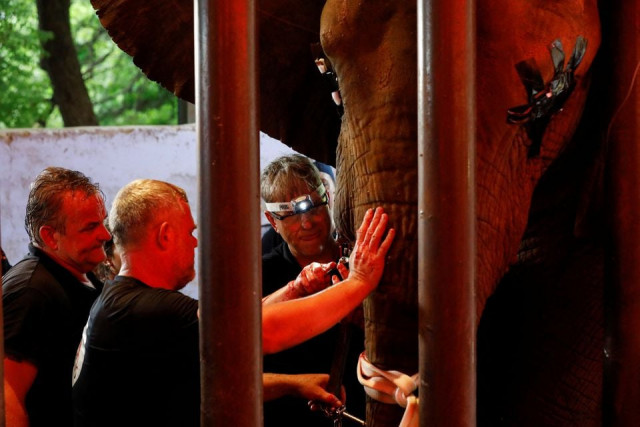‘Animal care key to public health’
Report calls for boosting veterinary sector to curb infections

Stressing the need to invest in the veterinary sector, a welfare organisation has estimated that about 60 per cent old and 75% emerging infectious diseases are caused by animals. Brooke, an organisation working on the health of working animals around the world, stated in a report that there was an imbalance in animal health services in Pakistan. Animal health services are essential not only for public health but also for the economic development of the country.
There is a need to invest in the animal health sector in Pakistan, increase the number of veterinary specialists and the production capacity of medicines and vaccines, it added. Pakistan's animal population is estimated at one billion, compared to 131 million in the United Kingdom, but it has half registered doctors in the sector as compared to the UK. The report highlighted that more than eight million rural families are engaged in livestock production, from which they earn more than 35% of their household income.
But in Pakistan, there is only one veterinarian to check the health of 100,000 cattle. Brooke Pakistan Pogramme Manager Dr Javed Gondal stated that improving animal health and welfare was critical to sustainable development and poverty reduction in Pakistan. “We believe that the recommendations in the 'Action for Animal Health' policy brief can play an important role in achieving these goals,” he said. The organisation’s head of global animal health, welfare, community development and research Dr Klara Saville said an estimated 60% of old and 75% of new or emerging infectious diseases came from animals.
So far, underinvestment in the animal health sector has led to shortage of veterinary manpower, drugs and vaccines, and gap in disease surveillance. The report recommended that more attention needs to be paid to add preventive veterinary, herd health, and complementary and alternative veterinary medicine into the animal health education curriculum. The quality of education in colleges and universities is contested and there is no quality control mechanism in the private sector after qualification. The Drug Regulatory Authority of Pakistan was established to regulate the manufacture, import, export, storage, distribution and sale of human and animal health related drugs and vaccines.
However, there is lack of a comprehensive animal disease surveillance system in then country, with most disease surveillance data collected at the provincial level using paper formats, which hinders rapid data collection and sharing for proper response. To address global health threats, Pakistan must strengthen animal health education, institutions, workforce, surveillance, vaccine and drug quality and control. This starts with developing an appropriate legislative and regulatory framework, the report suggested. Along with policies, better communication and data sharing in the health sectors is essential. Communities should be involved in animal welfare, disease prevention, surveillance and control measures, it added



















COMMENTS
Comments are moderated and generally will be posted if they are on-topic and not abusive.
For more information, please see our Comments FAQ